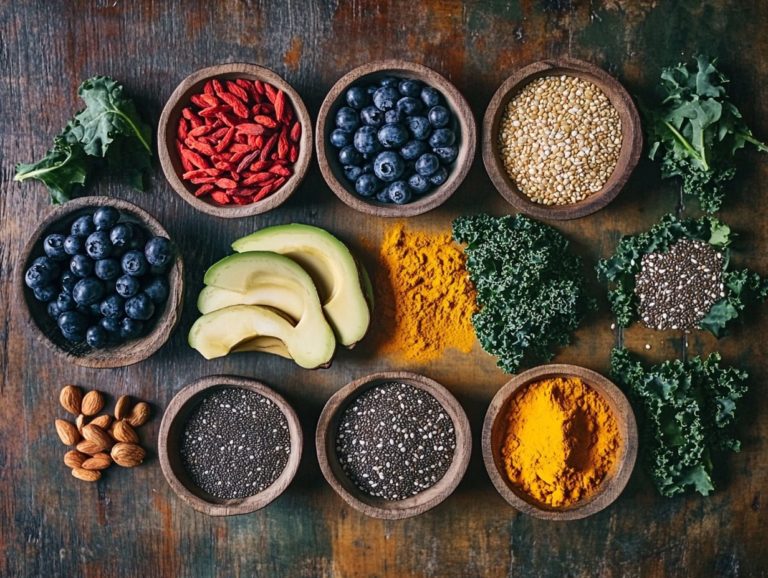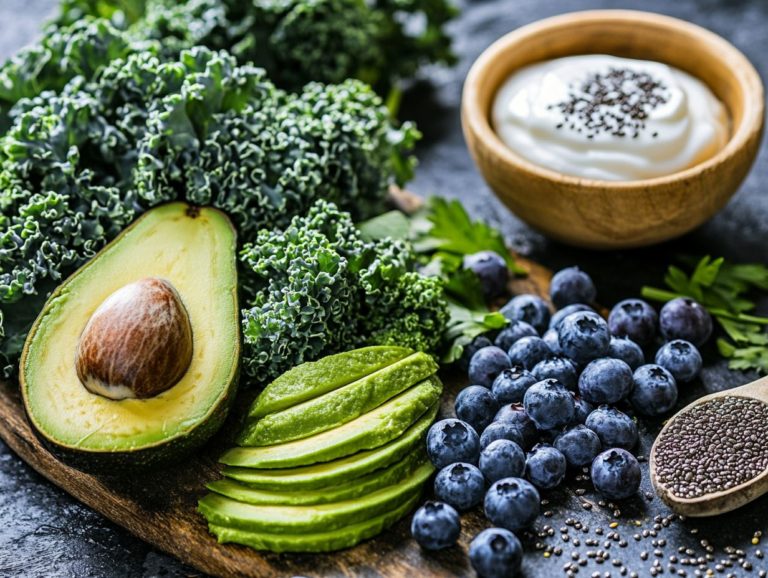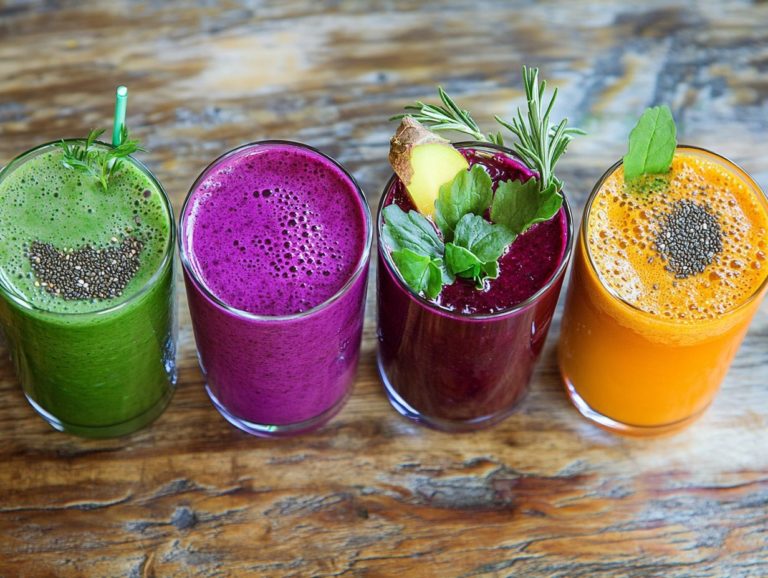The Superfood Trend: Is It Just a Fad?
The superfood craze has transformed the culinary landscape. It captivates health enthusiasts and everyday consumers alike.
What qualifies as a superfood? These nutrient-packed foods have gained massive attention, and this article explores their benefits and potential drawbacks, like cost and misinformation.
By learning how to incorporate these ingredients into your diet, you can make smarter health choices amid all the hype.
Contents
Key Takeaways:
- Superfoods are nutrient-dense foods with popular but not always proven health claims.
- Incorporating superfoods can be beneficial, but be mindful of their cost and possible misinformation.
- Consider alternative nutritious options and consult a healthcare professional when adding superfoods to your diet.
The Superfood Craze
The superfood craze has captivated the health-conscious, reshaping how nutrition and dietary choices are viewed.
From chia seeds and quinoa to acai and goji berries, these foods are marketed for their impressive nutritional profiles and health claims.
Defining Superfoods
Superfoods are nutrient-rich foods that offer many health benefits.
They are loaded with antioxidants, vitamins, and beneficial compounds from plants that support your wellness journey.
The Rise in Popularity
Superfoods’ popularity stems from consumer knowledge, research, and smart marketing that highlight their health benefits.
As you become more aware of nutrition, recent studies show the potential advantages of these nutrient-packed foods.
Benefits of Superfoods
The advantages of superfoods are often highlighted in media and research.
Claims suggest these nutritional powerhouses can boost your health, aid in weight loss, and help prevent diseases.
Nutritional Value and Health Claims
The nutritional value of superfoods may vary, but these foods are generally packed with essential nutrients, antioxidants, and natural compounds that benefit health elements that drive a host of health claims supported by reputable organizations like the American Medical Association.
Research indicates that integrating superfoods such as blueberries, quinoa, and kale into your daily meals can significantly enhance cardiovascular health, bolster immunity, and improve cognitive function.
For example, the anthocyanins found in blueberries are associated with reduced inflammation and a decreased risk of heart disease. Quinoa provides all nine essential amino acids, which are the building blocks of protein, making it an outstanding option for those pursuing plant-based nutrition.
By grasping the specific advantages of these nutrient-dense superfoods, you can make exciting dietary choices that can transform your health!
Research and Evidence
Scientific research plays an essential role in validating the health benefits associated with superfoods, often uncovering how certain foods can profoundly influence your health outcomes.
Take, for example, a study from the Harvard T.H. Chan School of Public Health, which revealed that regularly enjoying berries, especially blueberries, is linked to a reduced risk of cardiovascular diseases.
Similarly, research from the University of California demonstrated that adding spinach a well-regarded superfood to your diet can boost cognitive function, thanks to its rich supply of antioxidants and vitamins.
These findings, backed by esteemed organizations like the American Heart Association, not only affirm the nutritional claims surrounding superfoods but also enable you to make smart eating decisions that can elevate your overall well-being.
Potential Drawbacks of Superfoods
Despite their allure, superfoods carry certain drawbacks that merit your attention. Consider the potential challenges related to cost and accessibility and the risk of overconsumption.
Be cautious of the misinformation about superfoods and their benefits.
Cost and Accessibility
High prices can put superfoods out of reach for many people, affecting their health choices. The cost and accessibility of superfoods can present considerable hurdles for you as a consumer.
These nutrient-dense foods often come with a price tag that far exceeds that of everyday fruits and vegetables, making them less accessible for many.
Take quinoa, for instance. A small bag can cost several times more than a bulk bag of rice, which might make you think twice before adding it to your shopping cart.
Many superfoods are imported, bringing additional shipping costs and fluctuating prices that can turn them into a less economical choice. Meanwhile, staples like carrots and potatoes are readily available at local markets for much lower prices, making them more practical for your daily meals.
This disparity raises essential questions about the dynamics of the food industry. Access to superfoods is frequently limited by where you live and your socio-economic status, complicating dietary choices across different communities.
Overconsumption and Misinformation
You may find that overindulging in superfoods often fueled by misinformation and overhyped health claims can actually lead to negative health outcomes instead of the benefits you expect.
Many consumers, drawn in by enticing advertisements, often perceive these foods as miraculous solutions for everything from weight loss to heightened energy levels.
When you believe that merely adding these items to your diet will make you immune to health issues, it s easy to overlook the essential balance that a nutritious diet requires.
The glorification of certain foods as super can overshadow the importance of variety, potentially resulting in an unbalanced intake of nutrients. This misguided approach not only jeopardizes your overall wellness but can also increase the risk of nutrient toxicity.
Additionally, it detracts from the vital need to consult health professionals when making informed dietary choices.
Making Informed Choices
Making informed choices about superfoods requires you to delve into their nutritional value, acknowledge any potential drawbacks, and consider alternative nutritious options that can also enhance a balanced diet.
This empowers you to choose delicious foods that boost your health and happiness!
How to Incorporate Superfoods into a Balanced Diet
Incorporating superfoods into your balanced diet requires some knowledge of their nutritional value and finding seamless ways to include them in your daily meals without overhyping their benefits.
Explore various preparation methods and creative recipes to elevate your nutrition effortlessly. For instance, toss fresh blueberries into your morning oatmeal for a burst of flavor and a powerful antioxidant boost. Quinoa works well as a delicious base for salads, offering essential proteins and minerals that complement a variety of ingredients.
Sprinkle chia seeds on yogurt or blend them into smoothies to introduce healthy fats and fiber. This transformation turns your meals into nutritious and satisfying experiences. It s crucial to pair these superfoods with a range of other nutrient-dense foods to promote overall health.
Alternative Nutritious Options
While superfoods often steal the spotlight, countless nutritious alternatives exist in everyday vegetables, fruits, and legumes, which offer comparable health benefits. These common foods, easily found in your local market or kitchen, can enhance your well-being without requiring drastic changes to your diet.
For example, kale is often touted as a superfood; you can swap it for spinach, which delivers vitamins A and C along with beneficial antioxidants. Similarly, oatmeal serves as an accessible alternative to more exotic seeds, providing fiber and supporting heart health.
Don t overlook beans and lentils. They offer a good source of protein and essential minerals. By diversifying your food choices, you can enjoy familiar and budget-friendly ingredients while reaping health benefits.
Frequently Asked Questions
What is the superfood trend?
The superfood trend refers to the growing popularity and marketing of certain foods as being highly nutritious and beneficial for overall health.
Are superfoods really that beneficial?
The term “superfood” is often used as a marketing tactic. While some foods may have health benefits, it’s important to maintain a balanced and varied diet for overall wellness.
What are some examples of superfoods?
Some commonly named superfoods include blueberries, kale, quinoa, and chia seeds. However, there is no definitive list of superfoods, and the term is frequently used loosely.
Is the superfood trend just a fad?
While the superfood trend has gained popularity in recent years, the concept of nutrient-rich foods has existed for a long time. Some specific superfood products or claims may be viewed as a fad.
Do superfoods have to be expensive?
No, not all superfoods are expensive. Many common fruits and vegetables, such as bananas, broccoli, and carrots, are nutrient-rich and affordable options.
Should I only eat superfoods for a healthy diet?
No, superfoods should not replace a balanced and varied diet. It s important to incorporate a variety of nutrient-rich foods, including superfoods, into your meals for overall health and well-being.
To get started, try a new superfood recipe this week!




